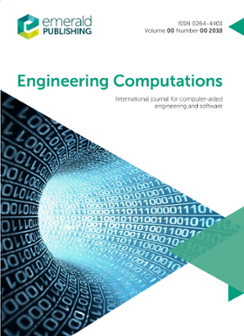Engineering Computations: Volume 10 Issue 1
Strapline:
International journal for computer-aided engineering and softwareTable of contents
FORMULATION AND IMPLEMENTATION OF CONDITIONS FOR FRICTIONAL CONTACT
KENNETH RUNESSON, MAREK KLISINSKI, RAGNAR LARSSONFinite element implementations of the classical (stick‐slip) and a regularized (elastic‐slip) friction laws are compared for a class of non‐linear slip criteria. The fully…
STRESS RESULTANT FINITE ELEMENT ANALYSIS OF REINFORCED CONCRETE PLATES
ADNAN IBRAHIMBEGOVIĆ, FRANÇOIS FREYAn efficient implementation of a constitutive model for reinforced concrete plates is discussed in this work. The constitutive model is set directly in terms of stress resultants…
NUMERICAL SIMULATION OF CONTINUOUS CHIP FORMATION DURING NON‐STEADY ORTHOGONAL CUTTING
G.S. SEKHON, J.L. CHENOTA finite element model for numerical simulation of non‐steady but continuous chip formation under orthogonal cutting conditions is described. The problem is treated as coupled…
RIGID‐PLASTIC IMPLICIT SCHEME FOR NON‐ AND THREE‐DIMENSIONAL ANALYSIS OF METAL FORMING BY FINITE ELEMENT METHOD
G. DE SAXCE, Z.Q. FENG, G. TOUZOTThis paper is devoted to the analysis of metal forming with assumption of rigid‐plastic behaviour with strain hardening. As opposed to the classical rate problem formulation based…
RANK ANALYSIS OF RECTANGULAR MATRIX AS AN ELEMENT OF CONTINUATION METHOD
MACIEJ KOWALCZYKThis paper is concerned with rank analysis of rectangular matrix of a homogeneous set of incremental equations regarded as an element of continuation method. The rank analysis is…
DAMAGE SIMULATION IN HETEROGENEOUS MATERIALS FROM GEODESIC PROPAGATIONS
D. JEULINWe propose a simplified method to simulate damage evolution in heterogeneous media from geodesic propagation calculations. The method introduced for the case of porous media…

ISSN:
0264-4401Online date, start – end:
1984Copyright Holder:
Emerald Publishing LimitedOpen Access:
hybridEditor:
- Prof. Chenfeng Li